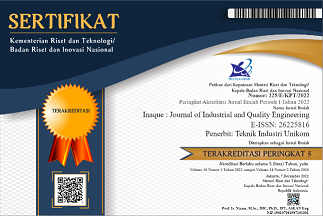PENERAPAN PENGENDALIAN KUALITAS DENGAN MENGGUNAKAN METODE FMEA DAN LTA PADA LEVER ASSY PARKING BRAKE
PENERAPAN PENGENDALIAN KUALITAS DENGAN MENGGUNAKAN METODE FMEA DAN LTA PADA LEVER ASSY PARKING BRAKE
DOI:
https://doi.org/10.34010/iqe.v11i1.8911Abstract
PT. KLM is a company engaged in the four-wheeled vehicle handbrake assembly manufacturing
industry. The company assembles a handbrake into a complete product, which is then usually sent
according to how many orders have been ordered to the company from consumers who ordered the
handbrake. At PT. KLM had several production failures on one model of the lever assembly parking
brake. This, of course, will have an impact on the production process in the company and loss of trust
for consumers. PT. KLM wants a solution to be able to identify existing problems using the Failure
Mode and Effect Analysis (FMEA) method which is intended to eliminate failures and seek solutions
to the causes of production failures by setting priorities based on the Risk Priority Number (RPN)
value for each failure. As for Logic Tree Analysis (LTA) to categorize events that cause production failures. Based on the results of the completion of the FMEA method, there are 10 potential causes
that fall into the category of 90% of the cumulative percentage which are then categorized using the
LTA method. The 10 biggest potential causes that can be identified in the use of the LTA method are
such as bend in the lever according to the Standar, the Press result is less than the Standar, the Press
result is not according to the Standar, the stopper pin does not enter, the length of the Release
Button that comes out is not according to the Standar.
Downloads
Published
Issue
Section
License
Authors who publish this journal agree to the following terms:
The author holds the copyright and grants the right of the first publication journal to enable INAQUE to share the work with acknowledgment of the author's work and early publications in this journal.
Authors may include separate additional contractual arrangements for the non-exclusive distribution of the journal's published version (for example, submit to an institutional repository or publish in a book), with the acknowledgment of its initial publication in this journal
Authors are permitted and encouraged to post their work online before and during the delivery process, as it may lead to productive exchanges, as well as quotations of previously published and longer works








